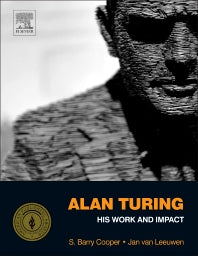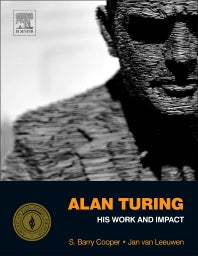Freshly Printed - allow 10 days lead
Couldn't load pickup availability
Alan Turing
His Work and Impact
Winner of the prestigious R.R. Hawkins Award from the Association of American Publishers, as well as the 2013 PROSE Awards for Mathematics and Best in Physical Sciences & Mathematics, also from the AAP
S. Barry Cooper (Edited by), J. van Leeuwen (Edited by)
9780123869807
Hardback, published 20 June 2013
944 pages
27.6 x 21.5 x 4.5 cm, 2.37 kg
"The ‘tour de force’ is that it is quite possible, even recommended, to read the book not linearly but by selecting pieces randomly, just for fun…We…urge readers of this brief review to read the book. We are sure that they will definitely enjoy it. It is quite possible that they will also find there ideas or flashes of inspiration for their own research." --EMS Newsletter, June-2014 "It is a rather remarkable achievement that the editors have managed to engage so many leading figures, 70 of them in all, and with such evident commitment…It is a fitting tribute to Turing's legacy…" --LMS Newsletter,October 1 2013 "This thick volume is a collection of Turing’s most significant papers along with commentary by people that appreciated and furthered his ideas. What will astound even the people that know the work of Turing is the breadth of his interests and depth of his competence." --MAA.org, Jan 2 2014 "There is a lot to be learned from his outlook and temperament, and Alan Turing: His Work and Impact can serve as both an instructional and an inspirational text." --Notices of the AMS, Sep 1 2014 "The massive volume is a collection of Turing's key publications as well as commentaries about the papers. The volume is organized in four parts, with each section arranged by publication year of the papers…Given the number of minds involved in this undertaking, the editors must be congratulated…Summing Up: Highly recommended." --CHOICE Reviews Online, December 2013 "The volume is an excellent introduction to many exciting topics that Turing greatly contributed to, and in some cases founded, from computability theory to programming languages, complexity theory, the philosophy of mind, artificial intelligence, and the emergence of structure in biology…Readers of almost any background and any level will find something fascinating, something to capture their imaginations, in this volume." --ComputingReviews.com, September 17, 2013 "Introductions and commentaries are written by outstanding specialists in the given domains -- altogether by 70 contributors. They provide insight into the significance and contemporary impact of Turing's work…The book is published in a beautiful and careful way. It is a remarkable contribution to the celebration of the centenary of Alan Turing's birth. It is indispensable for all interested in Turing's work." --Zentralblatt MATH 1270-2013 "…much of what’s presented is for specialists…But there’s still plenty even for a non-mathematician like me, some of it surprisingly moving…no matter how well you know the life and work of Turing, you’ll learn something from this book." --OECD Insights blog, August 26, 2013 "This accessible book is an essential read for those interested in Turing’s work and provides a more contemporary perspective than anything else that is available." --CyberTalk, September 2013 "This volume contains a mix of writings — some excerpts by Turing, but mostly writings about him and his work by those who understand his genius and his legacy. The writings include first person narratives of what he was like and what it was like to work with him, personal accounts of career-changing encounters with his thinking, and commentary on particular aspects of his work." --Reference and Research Book News, August 2013 "The new testament of computer science has come, 101 years after the birth of founding prophet Alan Turing…How big is the incomputable universe? Can digital machines think? Do daisies emerge from pure chemistry? If your soul craves answers to such questions, this is your new bible."--Nature, June 19, 2013 "Alan Turing: His Work and Impact makes Turing's most important papers readily accessible and affordable. With the four volumes of the previously published "Collected Works" now scarce and very expensive, this volume fills a pressing need in Turing scholarship. Moreover, the commentaries associated with Turing's papers in this volume offer new and compelling insights into the continuing importance and relevance of Turing's work, contextualizing it in contemporary contexts and providing richly elaborated explanations of how and why Turing's work remains seminal for a wide variety of fields, including computational science, cognitive science, artificial intelligence and more." --N. Katherine Hayles, Professor of Literature, Duke University
In this 2013 winner of the prestigious R.R. Hawkins Award from the Association of American Publishers, as well as the 2013 PROSE Awards for Mathematics and Best in Physical Sciences & Mathematics, also from the AAP, readers will find many of the most significant contributions from the four-volume set of the Collected Works of A. M. Turing. These contributions, together with commentaries from current experts in a wide spectrum of fields and backgrounds, provide insight on the significance and contemporary impact of Alan Turing's work. Offering a more modern perspective than anything currently available, Alan Turing: His Work and Impact gives wide coverage of the many ways in which Turing's scientific endeavors have impacted current research and understanding of the world. His pivotal writings on subjects including computing, artificial intelligence, cryptography, morphogenesis, and more display continued relevance and insight into today's scientific and technological landscape. This collection provides a great service to researchers, but is also an approachable entry point for readers with limited training in the science, but an urge to learn more about the details of Turing's work.
Part I: How Do We Compute? What Can We Prove? 1.Alan Mathison Turing 2.On Computable Numbers, with an Application to the Entscheidungsproblem 3.On Computable Numbers, with an Application to the Entscheidungsproblem – correction 4.Review of Turing 1936-7 5.Computability and ?-definability 6.The p-function in ?-K-conversion 7.Systems of Logic based on Ordinals 8.A Formal Theorem in Church's Theory of Types 9.The Use of Dots as Brackets in Church's System 10.Practical Forms of Type Theory 11.The Reform of Mathematical Notation Part II: Hiding and Unhiding Information: Cryptology, Complexity and Number Theory. 1.On the Gaussian Error Function 2.A Method for the Calculation of the Zeta-function 3.Some Calculations of the Riemann Zeta-function 4.On a Theorem of Littlewood 5.The Word Problem in Semi-groups with Cancellation 6.Solvable and Unsolvable Problems 7.The Word Problem in Compact Groups 8.On Permutation Groups 9.Rounding-off Errors in Matrix Processes 10.A Note on Normal Numbers 11.Turing's treatise on the Enigma (Prof's Book); Report by Turing on U. S. Navy cryptanalytic work and their machinery, November 1942; Speech System 'Delilah' - report on progress, 6 June 1944; Checking a Large Routine; An early program proof by Alan Turing; Programmers' Handbook for the Manchester electronic computer; Local Programming Methods and Conventions Part III: Building a Brain: Intelligent Machines, Practice and Theory. 1.Lecture to the London Mathematical Society 2.Intelligent Machinery 3.Computing Machinery and Intelligence 4.Chess; Solvable and Unsolvable Problems 5.Intelligent Machinery: A heretical theory; Can digital computers think?; Can automatic calculating machines be said to think? 6.Some Remarks on the Undecidability Results Part IV: The Mathematics of Emergence: The Mysteries of Morphogenesis. 1.The Chemical Basis of Morphogenesis 2.A Diffusion Reaction Theory of Morphogenesis in Plants 3.Morphogen Theory of Phyllotaxis; Geometrical and Descriptive Phyllotaxis; Chemical Theory of Morphogenesis; A Solution of the Morphogenetical Equations for the Case of Spherical Symmetry 4.Outline of the Development of the Daisy
Subject Areas: History of mathematics [PBX]


